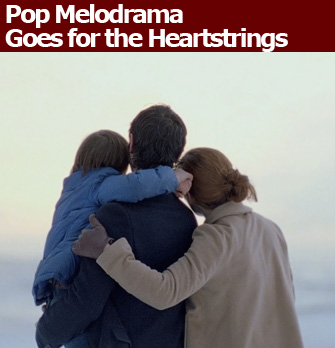
After seeing that the new movie La Guerre Est Déclarée (Declaration of War) had received an aggregate four-and-a-half out of five stars from French critics, I rushed out to see it on opening day without reading any of the reviews or knowing anything about the film, wanting to see it with no preconceptions.
Imagine my surprise to discover a lighthearted dramatic comedy about a little boy with a malignant brain tumor. After a scene in which we see a woman accompany a boy of about seven years old to a scanner exam in a hospital, the film flashes back to the love story between the woman, Juliette, and her lover, named – no kidding – Roméo (respectively played by writer-director Valérie Donzelli and actor and fellow screenwriter Jérémie Elkaïm). We witness the ecstasy of their torrid love affair, with lots of making out in public places (the Parisian setting oblige), and the tensions that arise in their relationship after their little boy, Adam, is born and the reality of everyday life sets in.
When he is two, it becomes clear that something is wrong with Adam. Luckily, the large tumor on his brain is operable, and the operation by a great neurosurgeon (in Marseilles, necessitating lots of frantic trips between Paris and the South of France that add nothing to the film) is a success. With the good news comes the bad: the tumor is malignant, and Adam will have to undergo long series of chemotherapy treatments.
In one scene that takes place during the night before their two-year-old’s big operation, Roméo and Juliette decide to tell each other their greatest fears. It goes back and forth like this: “I’m afraid he will become a vegetable.” “I’m afraid he will become a vegetable and go blind.” “I’m afraid he will become a vegetable and go blind and deaf.” “I’m afraid he will become a vegetable and go blind and deaf and be a dwarf.” “I’m afraid he will become a vegetable and go blind and deaf and be a dwarf and be gay.” “I’m afraid he will become a vegetable and go blind and deaf and be a dwarf and be gay and black.” “I’m afraid he will become a vegetable and go blind and deaf and be a dwarf and be gay and black and autistic.” And so it goes; their deepest fears are turned into a giggly game of one-upmanship that also manages to insult a number of minority groups.
A few scenes in the hospital lead us to believe that the film is about to turn into an exposé of the inhumanity of the medical profession, but that thread simply disappears. The main focus is on the life of the couple during the treatment of Adam, whom we barely see during this period. They party wildly with their friends, fight and make up, and finally organize their lives to battle Adam’s illness.
Yes, life must go on when people are ill and dying, and laughter is indeed good medicine, but the tone of this film seems all wrong. While there are moments of anguish, the overall cheeriness of the film and the reaction of the parents just don’t ring true.
Donzelli and Elkaïm, who wrote the script together based on their own real-life experience, would probably protest by saying, “That’s how it really happened!” but there are just too many false notes in this translation of real life into onscreen fiction: the jokey, flippant tone (which seems to be a way of pandering to the audience to make it easier to watch what would normally be a wrenching story); the clichés (the Amélie-like high-speed filling-in of backstory; the couple chasing each other in slo-mo on the beach); the joyful music at tragic moments; the two main characters suddenly bursting into song to profess their love for each other (but only once, so this doesn’t make this a musical); and the appearance of a narrator in the middle of the film to help move the story along faster.
The happy ending comes as no surprise, since we have already seen the older Adam alive at the beginning of the film – so much for suspense. And, although the narrator tells us that Roméo and Juliette eventually split up, we see them blissfully happy together on the beach at the end, leaving us wondering.
While there are some lovely moments, they don’t add up to a good movie. One critic whose review I read afterward and who loved the film called it a tear-jerking “pop melodrama.” I’d say that’s a fair description, except that I couldn’t squeeze out a single tear.
This is Donzelli’s second movie after the successful La Reine des Pommes (The Queen of Hearts). Let’s hope that she returns to fiction for her next effort; real life is just too close to home.
Favorite